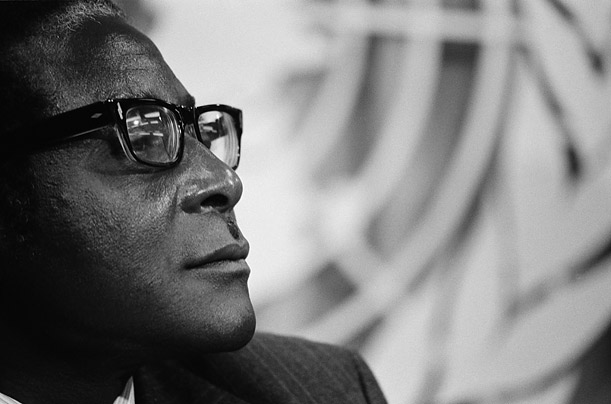A Tale of Two Elections: Zimbabwe at the Polls in 2008
By Jocelyn Alexander | December 2008
Zimbabwe’s politics are profoundly shaped by violence. Violence has motivated, divided and united each of Zimbabwe’s political parties in distinctive ways, it has shaped their ability to mobilise, their constituencies and their ideology, it has marked successive electoral contests and it has been used to transform the state. The ruling Zanu(PF)’s ‘third chimurenga’, launched in 2000, is rooted in a historical narrative of violence that links the uprisings against conquest in the 1890s to the liberation war of the 1970s and the battle to reclaim the nation’s white-owned farmland in 2000. For those in opposition politics, the violence of the third chimurenga evokes a different lineage: the extreme repression – known as Gukurahundi – that was launched against Zanu(PF)’s liberation-era rival Zapu in the 1980s, and the violence periodically directed at civic and political opponents of Zanu(PF) since then.
Keywords: Zimbabwe
Still Missing: Leading Zimbabwe Human Rights Activist Abducted
By Africa Action | December 2008
Africa Action is concerned about the whereabouts of Justina Mukoko, a prominent civil socity leader in Zimbabwe, reportedly missing for over forty-eight hours. As the Director of the Zimbabwe Peace Project, Jestina has been instrumental in keeping the world informed of human rights abuses in Zimbabwe.
Keywords: Zimbabwe
Helping the people of Zimbabwe
By ACAS | December 2008
Understanding the Zimbabwean crises or acting on it, is only part of the story. Meanwhile, people lack access to basic necessities: medicines, health services and food. Here’s some ideas how you can help.
Keywords: Africa Action | Crisis in Zimbabwe Coalition | humanitarian aid | Imani Countess | Priority Africa Network | UN World Food Program | USAID | Zimbabwe | Zimbabwe Congress of Trade Unions | Zimbabwe National Students' Union
New Journal on Law, Social Justice and Global Development
By ACAS | September 2008
The first issue of LGD, Law, Social Justice and Global Development, a new electronic law journal published by Warwick University, is now available online.
Keywords: development | social development | South Africa | water | Zimbabwe
Robert Mugabe’s Legacy
By Sean Jacobs | September 2008
One of the legacies of that time – and a testament of the power of the nationalist narrative that African independence leaders embodied – is that few if any of Mugabe’s present Western critics publicly denounced these murders. Instead he received a knighthood from Queen Elizabeth II in 1994 and honorary degrees from American universities. …read the rest
Keywords: Zimbabwe
ACAS events at 2008 African Studies Annual Meeting
By ACAS | September 2008
ACAS meets every year at the African Studies Association annual meeting. ACAS has four roundtables scheduled for the African Studies Association 2008 Annual Meeting with the theme “Knowledge of Africa: The Next Fifty Years” scheduled for November 13-16, 2008, in Chicago.
Keywords: African Studies Association | Africom | Zimbabwe
After the Vetoes on Zimbabwe: What’s the Next Step?
By James H. Mittleman | July 2008

Now that efforts to impose sanctions on Zimbabwe and regional mediation have failed to topple the Mugabe regime, what are the alternatives?
Keywords: Zimbabwe
Introduction: The Zimbabwe Crisis
By Timothy Scarnecchia | June 2008
This special issue on the 2008 Zimbabwe elections introduces the issues surrounding the elections and the current political violence leading up to the June 27th Presidential run-off.
Keywords: Robert Mugabe | Zimbabwe
Washington Post: How to Handle Dictators
By James H. Mittleman | June 2008
In a June 22 Outlook commentary, “The Only Answer to the Mugabes of the World May Be a Coup,” Paul Collier advocated encouraging coups to topple dictators and achieve “improved governance” in “such sad little states as Zimbabwe and Burma.”
Keywords: Zimbabwe
Editorial: In Zimbabwe Today, Politics is Violence
By Timothy Scarnecchia | June 2008
In previous elections paramilitary violence came before the actual polling, usually slowing down in the week or so before polling when international election observers and the world press arrived. This has not been the case in the present elections, as violence since the beginning of May has been reported by numerous and diverse sources to be perpetrated by the police, military, and the militias under ZANU-PF control. The intention of this political violence is to terrorize, destroy, and break the will of the MDC and their supporters leading up to the June 27th run-off for the presidential election. What makes the political violence feel like such an excessively brutal betrayal this time around is that it had appeared, for a brief period in April, as if the impressive showing of the MDC in the election and the wide support it had gained would have insulated it from further reprisals from the ZANU-PF before the run-off. After all, wasn’t the world watching this time? This hope for a peaceful campaign was not to happen. As a number of the contributions to this special issue have suggested, violence is the only language ZANU-PF knows, and it has once again unleashed its complete arsenal, resulting in the killing of 50 MDC members as of May 25th, 2008, and the displacement of hundreds of people, including rural villagers, teachers, and activists.
Keywords: MDC | ZANU-PF | Zimbabwe


